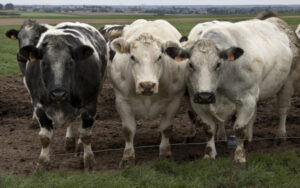Climate Skeptics Fear an Anti-Meat Agenda: Who Are These Meat Industry Advocates?

An ever-growing topic of discussion when it comes to climate change is its relationship to the food that we eat. We don’t just need to eat to keep ourselves healthy, we need to eat in a way that keeps the planet healthy as well. With its huge carbon emissions, the meat industry has become a target, with many shifting their diets away from meat and towards more plant-based regimes.
But of course, that doesn’t make the meat industry happy.
“There is an anti-meat agenda out there, and this is a way to go after meat,” Daren Bakst, a fellow at the Heritage Foundation, told the Los Angeles Times. “We need to just focus on nutrition. Once you bring up these other things, it undermines the legitimacy of the guidelines.” He is referring to the reworking of the government’s food pyramid. Government scientists, in the 2015 Dietary Guidelines Advisory Committee, had recommended that it should be reworked to consider the heavy carbon impact of the meat industry.
The conservative research and advocacy organization Heritage Foundation isn’t alone in referring to people that advocate for more plant-based diets as an “anti-meat agenda.” Start reading articles about meat, the environment and vegetarianism, and you’ll see that regular mentions of an “anti-meat lobby,” almost likening the movement of people who advocate for plant-based diets to some sort of anti-meat conspiracy. Just Google it to see what I am talking about.
The Center for Consumer Freedom, a non-profit entity that lobbies on behalf of the fast food, meat, and alcohol industry, certainly feels this way. The organization has an entire page devoted to discussing this issues, writing that “A growing number of anti-meat zealots usually driven by an animal rights agenda, are disseminating shoddy science in an effort to drive consumers toward a meatless diet.”
This is the same group that recently took issue with the Sierra Club’s Agriculture and Food Policy Task Force that was set up to review and recommend changes to their 1976 Agriculture Policy. The task force recommended that “minimizing the production and consumption of domestic animals… is one way to reduce greenhouse gas reduction. The Center for Consumer Freedom thinks that “The new agenda looks more PETA-lite than conservation-minded.”
While it has been shown that a vegetarian diet accounts for half the CO2 emissions of a meat diet, there is certainly this idea that everyone advocating for plant-based diets is “out to get” the meat industry, making the issue more about emotion than science. “The environmental activist community, animal rightists, the anti-large farming/ranching crowd are committed to our destruction,” wrote Troy Marshall, a rancher, in Beef Magazine, the nation’s leading cattle publication. “I don’t understand why these people hate our way of life so much. I think we all consider ourselves good people, trying to live good lives, working to take care of God’s creatures and the environment while providing nutritious food for our fellow humans. I find it hard to understand how and why people get up each morning committed to destroying my way of life.”
And that strategy of playing to emotions is exactly what climate skeptics do. The New Scientist published an article titled “Living in denial: Why sensible people reject the truth,” that said: “Denialist explanations may be couched in sciency language, but they rest on anecdotal evidence and the emotional appeal of regaining control.”
Science shows us that reducing our meat intake is good for the environment, but as long as big industry is involved and they feel their control slipping, you can expect people to react more with emotion than scientific justification.
Related on Organic Authority
Meat Industry Claims First Amendment Prevents the Need for Country of Origin Labels
Cheap Burgers and Factory Farms: Why is Our Meat Industry So Broken?
Benefits of Being Vegetarian Include Half the CO2 Emissions Meat Eaters Produce, Study Finds
Image: glasseyesview

